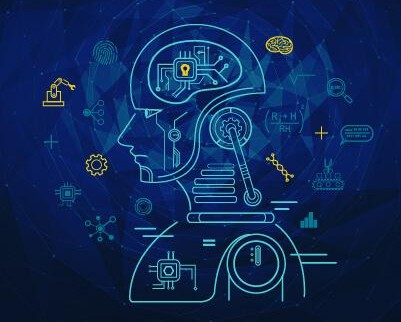July 23, 2019 – The following comes from the desk of Kayleigh Alexandra, a writer and campaign designer for MicroStartups, a website focused on the charity world and microbusinesses. With years of experience in the sustainability, marketing, and creative industries, Kayleigh knows how to grow and build a business from scratch. Visit her blog or follow her on Twitter @getmicrostarted for the latest startup and entrepreneur-based news, tips, and advice. This is Alexandra’s second contribution to 21st Century Tech blog and, as always, your comments are welcomed.

Recent decades have turned the classic notion of a job for life into something of a joke in the Western world. It may endure in certain cultures (Japan, for instance, with its rigid corporate bonds), but here we have fresh generations that have grown up knowing that their prosperity is not guaranteed provided simply that they work hard and be patient.
We can certainly blame the march of technology for some of this. Automation has eaten into numerous fields, with robotics increasingly capable of handling classic vocational trades without manual intervention. Yet technology is also the saving grace for those struggling to reach success, because it’s transforming the practice of starting a business.
In this piece, we’ll take a look at some of the ways in which artificial intelligence (AI) is helping people start businesses — but first, we’ll consider what AI actually means in this context. Let’s begin.
Clearing up the confusing definition of AI
A recurring problem with the discussion of AI is that it doesn’t have a consistent definition in everyday discourse. Some people think of the science-fiction concept of artificial sentience: creating a conscious mind within a computer system (at incredible risk, of course, and with concerning moral implications) — but that isn’t how it’s used in business.
In the business world, AI broadly refers to using computerized systems to mimic elements of human intelligence. Take a task that the human mind is typically required for, and either break down and replicate the process of handling it, or find an alternative route to the same result. The intelligence part simply requires some degree of adaptability (however small).
What this means in practice is that the most basic form of AI is machine learning. Machine learning sees algorithms programmed to adapt to the data they’re given (and even the results they produce) and allows us to create AI processes that can yield steadily-improving results without manual intervention. Algorithms designed to compete can improve by facing themselves — and it’s this type of AI that we’re in the process of mastering.
Enhanced microlending in the Developing World
The traditional lending process doesn’t favor unknowns. It distributes money to those deemed most likely to pay it back, with the decision process stemming from a combination of precedent and gut instinct. AI can do better — and it’s already doing better through advanced microlending platforms such as Upstart, which offers benefits over traditional lenders including lower rates, speed, and no prepayment penalties.
Using machine learning, such platforms can dig deep into online data and reach smarter conclusions about how much money can be offered, and to whom. No longer do ambitious people in the Developing World need to struggle for support because they don’t have suitable credit histories or the right credentials. Now, they can get the financial investment they need through the use of AI systems to get their businesses started.
AI lessening the typical business workload
One of the most daunting aspects of starting a business is the workload that results from it. Entering self-employment can be very refreshing after a spell in the regular working world, but a solo entrepreneur must rapidly start hiring or invariably burn out (there’s simply too much to get done, particularly given the opportunities and demands of the online world).
Through using tools capable of machine learning, however, entrepreneurs can massively decrease workloads, making it possible for them to continue running everything alone, and start hiring only when (or if) they wish.
Shopify Plus provides a list of six must-have technologies to build the best eCommerce stack. It includes using data-driven personalization to improve customer experiences and smart search functionality to boost conversions and enhance performance.
Coupling the advent of technologies like this with the time-saving tactics of eCommerce is particularly useful.
Buying stores through marketplaces instead of building them, working from anywhere with internet access, outsourcing fulfillment by using dropshipping suppliers, and you have a recipe for getting a business off the ground both rapidly and effectively in a fraction of the time it previously would have taken.
Opportunities for AI-centric businesses
Technology, as we previously stated, has both damaged and helped renew employment. world, AI as a technology is no exception. An entire AI-support industry is growing before our eyes. What does this mean? Not only do the number of AI-centric positions increase every day, but the opportunity for people to start AI businesses is also growing. The field is on the cusp of a massive worldwide boom, and that makes it a great time for someone to jump on the AI bandwagon.
Not just anyone can start an AI-driven company, of course, but it’s far easier than you might think. If someone takes the time to learn how machine learning can be deployed, one can find applications for almost any industry niche. Pick the right spot, make a compelling case, and reap the rewards.
What’s in the near future
All that said, what can we expect from AI in the immediate future?
Firstly, I’m going to stick with machine learning for now, because anything beyond that remains highly impractical for the moment. Perhaps the tech world will move beyond this form of AI and we’ll see technologies like quantum computing become reality, but I’ll believe it when it happens.
In general, I expect to see machine learning implemented far more broadly than at present, and become readily configurable through the development of intuitive interfaces. I then expect people to use it in almost every area of small business, from finding and negotiating with new suppliers to forecasting financial results (or even employee turnover).
What will be left for humans to do? Anything that requires that spark of creativity: in-person networking, long-form content, product innovation, and other such things. But every other facet of building and running a business will, with AI, be as easy as snapping your fingers.















